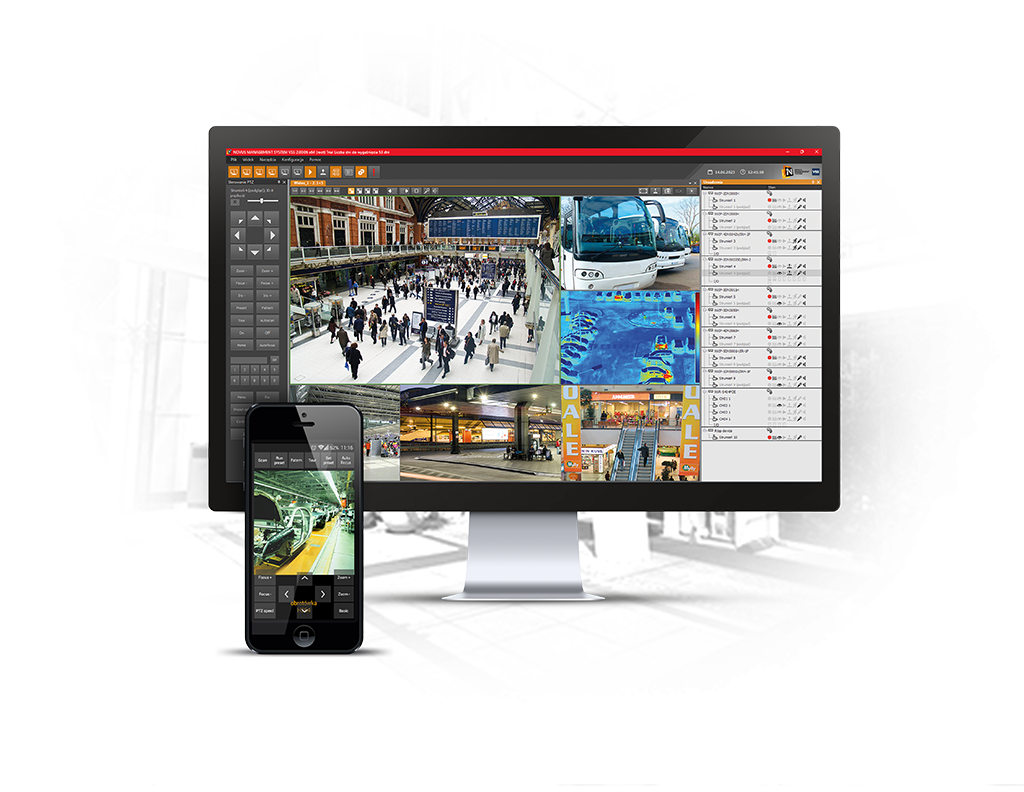








The recorders in combination with the cameras of the same series, apart from the configuration of basic parameters such as contrast or brightness, allow for a much more advanced interference with the camera settings. Depending on the functionality of the camera, from the recorder level it is possible, among others:
- changing the network settings of the camera
- stream parameters setting
- setting the zoom and focus in a camera with a motor zoom lens
- enabling and configuring the image analysis function
The mobile application allows for remote monitoring of a system based on 6000 (old 3000) series cameras, via a smartphone with Android or iOS. Basic camera configuration as well as PTZ control are available from the phone. Connection of the camera with the application does not require the use of a recorder (local network, port forwarding)
The camera equipped with an SD card slot allows local recording of video material, so it is resistant to possible interference in the transmission of data between the camera and the recorder. Playback and export of saved material can be done from the level of the web browser.

Novus Management System VSS software is an advanced platform for managing video monitoring system. Novus Management System VSS can combine different standards of CCTV: Analog, AHD, IP, and at the same time is a software with a high degree of flexibility, finding its application in both small and large and distributed installations
VCA (Video Content Analysis) features are a collection of techniques and algorithms that analyze and interpret video to detect threats, anomalies, or unwanted activities. VCA algorithms make it possible to detect and identify objects, analyze the movement of objects, including their tracking, but also allow, for example, face or license plate recognition. In thermal imaging cameras, VCA functions allow for early detection of fires.
The VCA in the cameras can operate automatically, without the need for human intervention, which enables a quick response to emergency situations.
The ONVIF standard allows for basic compatibility between devices from different manufacturers and brands. The camera + recorder set supporting the ONVIF standard guarantees that the camera will be found, added, recorded and will transmit information about motion detection.
The video encoding standard, which is the successor to the H.264 standard, which allows to save up to 35% of the bandwidth.

Power over Ethernet - the technology allows you to power the IP camera directly from the recorder, without the need for additional power devices.
The function allows to trigger a local alarm, send an e-mail, activate the relay after detecting the formation of people's communities from the observed scene. The function can be used in city monitoring.
Application example:
- monitoring public space, including markets, squares
The function allows to trigger a local alarm, send an e-mail, control the relay, or send a push notification to the mobile application after detecting in the observed zone the detection of the object left for a specified time.
Application example:
- leaving luggage at train stations, metro stations
- places with a parking ban
The function allows to trigger a local alarm, send an e-mail, activate the relay, or send a push notification to the mobile application after detecting the disappearance of the object in the designated detection zone.
Application example:
- protection of museum exhibits
The function allows to trigger a local alarm, send an e-mail, control the relay, or send a push notification to the mobile application after violating the limits of the defined detection zone (up to 4 detection zones).
Application example:
- perimeter protection of the object
- protection of strategically important objects
The function allows to trigger a local alarm, send an e-mail, activate the relay, or send a push notification to the mobile application after:
- covering the camera
- changing the scene of the camera (physical interference in the assembly)
- changing the focus settings (with cameras manually
adjustable focal length)
The function allows to trigger a local alarm, send an e-mail, activate the relay, or send a push notification to the mobile application after the object has crossed the previously defined line (maximum 4 lines per one camera).
Application example:
- perimeter protection of the object
| Image | |
|---|---|
| Image Sensor | 4 MPX CMOS sensor 1/3” OmniVision |
| Number of Effective Pixels | 2688 (H) x 1520 (V) |
| Min. Illumination | 0.05 lx/F1.2 - color mode, 0.01 lx/F1.2 - B/W mode |
| S/N Ratio | > 120 dB (AGC off) |
| Electronic Shutter | auto/manual: 1/25 s ~ 1/100000 s |
| Digital Slow Shutter (DSS) | up to 1/3 s |
| Wide Dynamic Range (WDR) | yes (double scan sensor), 120dB |
| Digital Noise Reduction (DNR) | 2D, 3D |
| Defog Function (F-DNR) | yes |
| Highlight Compensation (HLC) | yes |
| Back Light Compensation (BLC) | yes |
| Lens | |
| Compatible Mount Type | CS |
| Iris Mode | D |
| Day/Night | |
| Switching Type | mechanical IR cut filter |
| Switching Mode | auto, manual, time |
| Switching Level Adjustment | yes |
| Switching Delay | 2 ~ 120 s |
| Switching Schedule | yes |
| Network | |
| Stream Resolution | 2560 x 1440 (QHD), 2592 x 1520, 2304 x 1296, 1920 x 1080 (Full HD), 1280 x 720 (HD), 640 x 480 (VGA), 320 x 240 (QVGA) |
| Frame Rate | 30 fps for 2592 x 1520, 60 fps for 1920 x 1080 (Full HD) and lower resolutions |
| Multistreaming Mode | number of streams: 3 |
| Video/Audio Compression | H.264, H.265, MJPEG/G.711 |
| Number of Simultaneous Connections | max. 5 |
| Bandwidth | 30 Mb/s in total |
| Network Protocols Support | HTTP, TCP/IP, IPv4, IPv4/v6, UDP, HTTPS, Multicast, FTP, DHCP, DDNS, NTP, SNTP, RTSP, UPnP, SNMP, QoS, IEEE 802.1X, PPPoE, SMTP |
| ONVIF Protocol Support | Profile G/S |
| Camera Configuration | from Internet Explorer, Chrome browser languages: Polish, English, Russian, and others |
| Compatible Software | NOVUS MANAGEMENT SYSTEM VSS |
| Video Analytics | |
| Functions | tamper, abandoned object, object disappearance, line cross, zone entrance, multi loiter, scene change, video blurred, video color cast |
| Other functions | |
| Privacy Zones | 4 video mask type: single color or 4 video mask type: mosaic |
| Motion Detection | yes |
| Region of interest (ROI) | 8 |
| Image Processing | 180˚ image rotation, sharpening, mirror effect, corridor mode |
| Prealarm/Postalarm | up to 6 s/up to 120 s |
| System Reaction to Alarm Events | e-mail with attachment, saving file on FTP server, saving file on SD card, alarm output activation |
| Interfaces | |
| Video Output | BNC, 1.0 Vp-p, 75 Ohm |
| Audio Input/Output | 1 x Jack (3.5 mm)/1 x Jack (3.5 mm) |
| Alarm Input/Output | 1 (NO/NC)/1 relay type (max. 12VDC/300mA) |
| RS-485 | yes |
| Network Interface | 1 x Ethernet - RJ-45 interface, 10/100 Mbit/s |
| Memory Card Slot | SD - capacity up to 128GB |
| Installation parameters | |
| Dimensions (mm) | 70 (W) x 60 (H) x 140 (L) |
| Weight | 0.4 kg |
| Enclosure | aluminium, white |
| Power Supply | 12 VDC, 24 VAC, PoE (IEEE 802.3af, Class 3) |
| Power Consumption | 2.8 W |
| Operating Temperature | -20°C ~ 50°C |
| Operating temperature with housing | -40°C ~ 50°C |

| File name | Description | ||
|---|---|---|---|
| NVIP-4DN3500C-2P-II_SHORT_EN_PL_ver1.0.pdf | User manual |
11.89 MB |
|
| CE_4DN3500C_II_EN.pdf | Certificate |
376.4 KB |